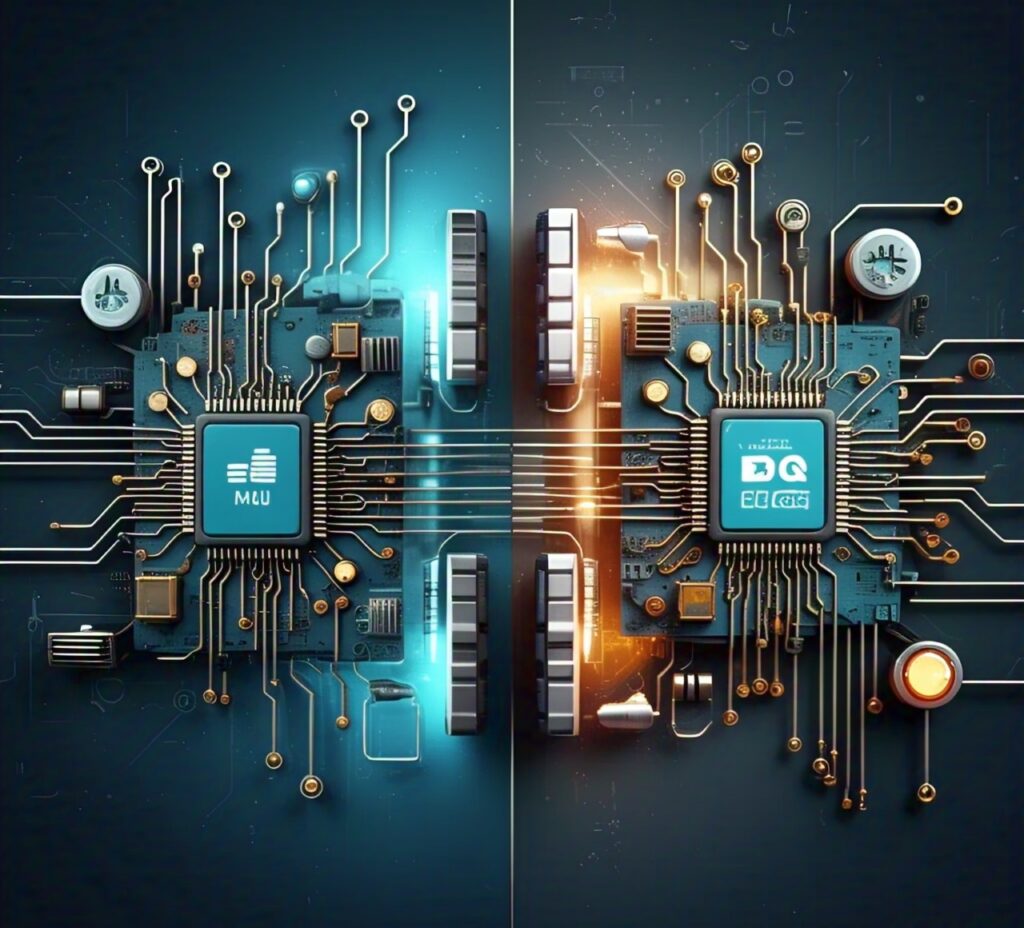Imagine you’re designing an embedded system. You need speed, efficiency, and control. But here’s the big question: should you go with an MCU or an FPGA? 🤔
This debate has been around for decades, and today, we’re diving deep into what makes these two technologies unique, where they excel, and which one is the right fit for your next big project. Buckle up! 🚀

🛠️ The Origins of Parallel Processing: FPGA Leads the Way
Long before MCUs even attempted parallel execution, FPGAs (Field-Programmable Gate Arrays) were already masters of hardware-level parallelism. Unlike MCUs that execute instructions sequentially, FPGAs allow multiple tasks to run at the same time, independently.
✅ Why is this important? Because in high-speed applications like real-time video processing, motor control, and AI acceleration, waiting for sequential execution is just too slow.
🔹 FPGA: The Reconfigurable Powerhouse
FPGAs are like a blank slate of logic gates, ready to be configured into custom hardware accelerators. They don’t run software in the traditional sense—you program the hardware itself.
🖥️ How it works:
- Instead of fetching and executing instructions like an MCU, an FPGA processes multiple tasks simultaneously using configurable logic blocks.
- Every logic unit inside an FPGA can operate independently, allowing true parallel execution.
- Developers can reprogram the FPGA to fit specific workloads, making it highly adaptable.
💡 Where FPGAs Shine:
✅ Real-time signal processing (e.g., radar, LiDAR, 5G).
✅ AI acceleration (low-latency neural network inference).
✅ Motor control applications requiring precise, high-speed feedback.
✅ Custom hardware acceleration for specific tasks.
⛔ Challenges of FPGAs:
❌ Requires hardware design knowledge (HDL programming).
❌ Higher power consumption compared to MCUs in simple tasks.
❌ More expensive and not ideal for low-cost mass production.
🔹 MCU: The Versatile Workhorse
Unlike FPGAs, MCUs (Microcontrollers) are fixed-instruction processors designed for control-oriented tasks. They don’t offer hardware-level reconfiguration, but they compensate with simplicity, efficiency, and ease of use.
🖥️ How it works:
- MCUs execute code sequentially, optimized with pipelines, caching, and hardware accelerators (e.g., DSP units).
- While some dual-core and multi-core MCUs enable limited parallel execution, they still rely on a central processing unit to schedule tasks.
- They are perfect for battery-powered, real-time embedded applications where power efficiency matters.
💡 Where MCUs Shine:
✅ Low-power embedded control systems (IoT, automation).
✅ Cost-sensitive applications (automotive, industrial control).
✅ Motor control with DSP acceleration.
✅ Simpler software development (C/C++, RTOS support).
⛔ Challenges of MCUs:
❌ Limited parallelism (especially compared to FPGAs).
❌ Fixed architecture (no hardware reconfiguration).
❌ Slower processing for high-speed AI and real-time video analytics.
⚖️ MCU vs FPGA: Head-to-Head Comparison
| Feature | FPGA (Field-Programmable Gate Array) 🏎️ | MCU (Microcontroller) 🚲 |
|---|---|---|
| Parallelism | True hardware parallel execution 🔀 | Mostly sequential with limited parallelism 🔄 |
| Flexibility | Fully reconfigurable hardware 🔧 | Fixed instruction set 📜 |
| Performance | High-speed, real-time processing ⚡ | Optimized for control applications 🎯 |
| Ease of Use | Complex (requires HDL, FPGA tools) 📜 | Simple (C/C++, RTOS) 💡 |
| Power Consumption | Can be high depending on complexity 🔋 | Optimized for low power ⚡ |
| Cost | More expensive 💰 | Cheaper, mass-producible ✅ |
| Best For | AI acceleration, signal processing, custom hardware | IoT, motor control, automation, battery-powered devices |
🏁 Conclusion: Which One Should You Choose?
💡 Choose an MCU if you need:
✔️ A cost-effective, low-power embedded system.
✔️ Simplicity and ease of programming.
✔️ Control-based applications with real-time constraints.
💡 Choose an FPGA if you need:
✔️ High-speed, real-time parallel processing.
✔️ AI acceleration or custom DSP capabilities.
✔️ Reconfigurable hardware for specialized applications.
Ultimately, MCUs and FPGAs serve different purposes. If your project needs control, efficiency, and ease of development, go for an MCU. But if you need raw speed, parallel execution, and hardware-level flexibility, an FPGA is the way to go. 🚀